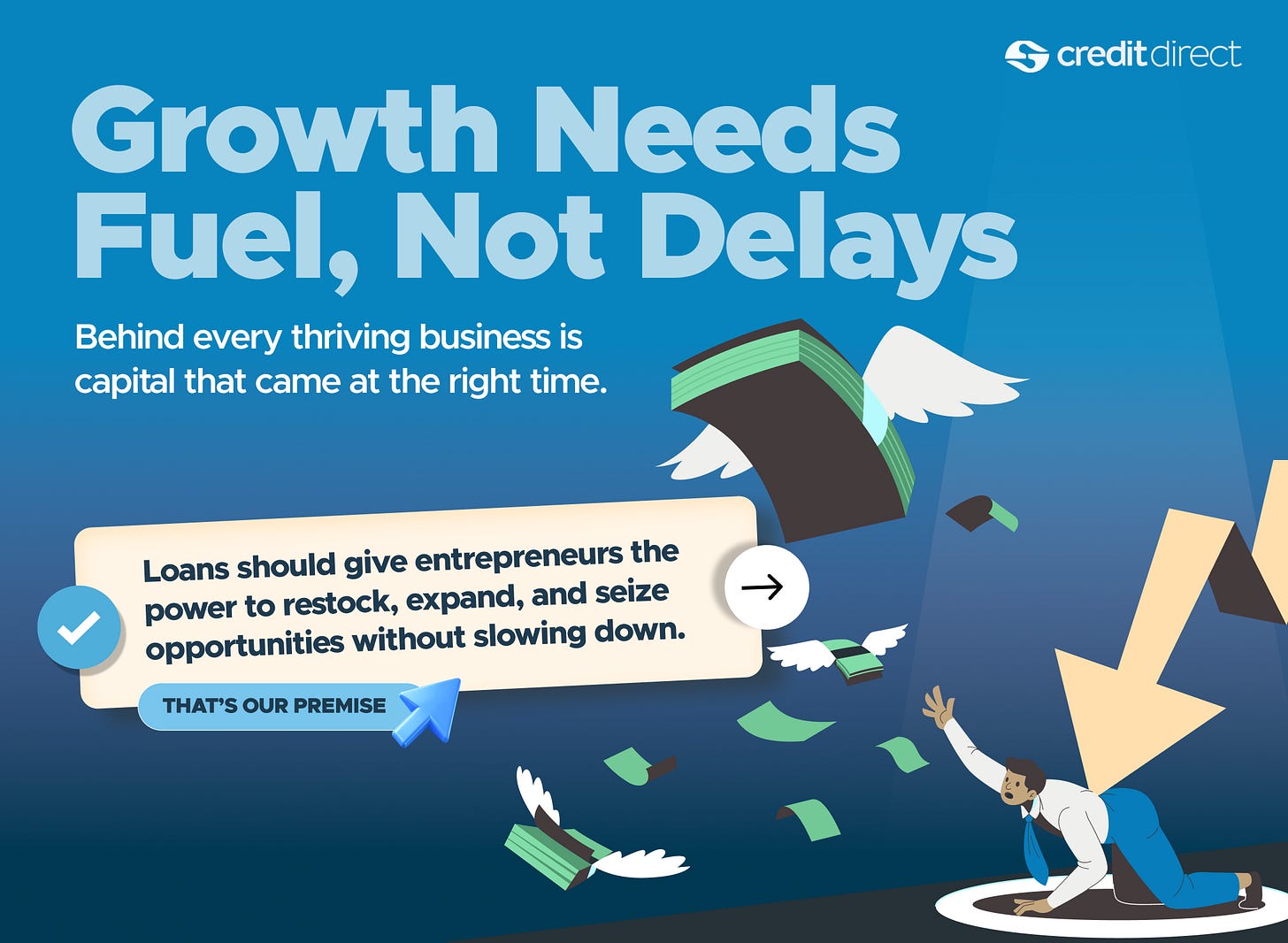Trust is the product
Everything else is just a bonus
If you missed last week’s newsletter on The Butterfly Memos, catch up here. If this email was forwarded to you, subscribe while it’s free:
TOGETHER WITH CREDIT DIRECT
Opportunities don’t wait, and neither should your business. With the right loan at the right time, growth becomes momentum, not a struggle.
Words that make you panic
If you have a bank account, there are certain word combinations you never want to see. Your bank’s name and “liquidity problems” in the same sentence rank high on that list. It rightfully triggers a primal panic; when a bank cannot produce depositors’ funds, it shatters the foundation of trust that banking rests on.
That panic is exactly what OurPass Microfinance Bank served up this week. Customers had been unable to withdraw funds for months, and when pressed, the company told TechCabal:
“That migration is now almost complete, and the temporary liquidity challenges it caused are being actively managed with all concerned stakeholders.”
Translation: your deposits aren’t available right now. The one thing a bank cannot afford to admit.
OurPass blamed two factors: a ₦25 million ($16,000) Business Email Compromise scam, and a core banking software migration. For a healthy financial institution, those are minor setbacks. If a mid-five-figure fraud loss freezes withdrawals, then questions must be asked about capital adequacy. And if a systems upgrade leaves customers locked out for months, that’s equally damning.
Customer funds and operational funds must always be segregated. History shows that once a bank starts offering excuses instead of cash, recovery is almost impossible. It’s also a reminder that fintech startups need actual bankers in the room.
OurPass didn’t start life as a bank. It launched in 2021 as a one-click checkout startup, a Nigerian version of Fast or Bolt Checkout in the U.S.
Both U.S. counterparts raised billions, operated in markets far larger than Nigeria, and still collapsed with fewer than 1,000 customers. OurPass’s $1 million raise came before those failures, but the warning signs were already visible.
By 2023, OurPass pivoted to business banking and secured a microfinance license, promising profitability within 12 months. A year later, instead of profit, it has liquidity problems.
It’s a painfully familiar story.
Business banking startups in Nigeria have had various versions of this story in recent times. Customers of Glade, Prospa, and Brass have all experienced this pain of not being able to access their deposits for months due to various operational and business reasons.
And across all four companies, it's the same vague excuses: “core banking or technical issues”, “a hack”, or silence that customers face. At least in the case of Brass, customers were made whole via a rescue purchase of the business.
There is one safety net: the NDIC insures microfinance deposits up to ₦2 million per depositor. That covers the smallest accounts if the worst happens. But insurance payouts are cold comfort when people need their money today.
The lesson doesn’t change: fintechs can be scrappy in design or distribution, but not with deposits. In banking, trust isn’t just part of the product. It is the product. Break it, and you don’t have a bank.
Flutterwave’s new feature
One of the more curious things this week was Flutterwave’s Tuesday announcement. The company pushed press releases to global outlets, but local players barely blinked. The news itself sounds straightforward: Flutterwave will now let you buy U.S. stocks.
The details are still pretty light, but here’s what we know:
The service runs on Alpaca, a U.S.-based brokerage API provider, and is live in Nigeria and Kenya with a broader rollout planned.
Depending on which report you read, it will be available inside Flutterwave’s app, but also exposed to other fintechs as an API.
That ambiguity suggests two possible strategies.
Infrastructure. This is most consistent with Flutterwave’s DNA. The company makes money selling rails—payments, payouts, issuing cards, compliance layers—that others build on. In that context, “buy U.S. stocks” is just another API surface, something a neobank or retail bank could plug in to expand their product set.
This path is consistent with Flutterwave’s trajectory after it shut down Barter in 2024 to focus on enterprise products and remittances. In this scenario, Flutterwave is not chasing Robinhood glory but simply widening the toolkit.
Consumer. If this feature is directly inside the Send app, it will benefit from an existing user base (there are no publicly available figures for Send’s subscriber count, although Flutterwave says users grew by 160%). A “buy stocks” button next to “send money” would mean instant reach, and here, Flutterwave would be both rail provider and operator.
The timing for this product cannot be ignored. Retail investors have been unusually active in Nigeria this year.
By some tallies, nearly ₦1 trillion has flowed into the Nigerian Exchange in the first seven months of 2025, a 56% jump from 2024. July saw retail trades surge to ₦516 billion, up 88% from June.
Some of that activity is credited to apps like Bamboo and Trove, which make it easier for everyday people to buy both local and foreign stocks in small amounts. A few breakout stocks (Beta Glass up 600% and MTN Nigeria up more than 100%) have helped stoke the frenzy. When your neighbour posts screenshots of their portfolio doubling, investing starts to feel more real.
The excitement is genuine, but this is not Nigeria’s Robinhood moment. Institutional investors remain the big movers, accounting for 80% or more of daily volumes.
Where Flutterwave could tilt the balance is compliance. The SEC has already forced every platform offering foreign stocks into partnerships with licensed local brokers, before creating a digital sub-broker licence. Bamboo and Trove fought those battles. Flutterwave enters a market where the rules are clearer, and it has the capital and relationships to glide through.
For smaller fintechs, the threat is an interesting undercurrent. If Flutterwave exposes the API and also runs its own retail product, then it becomes a partner and competitor. That’s the NIBSS dynamic.
When the missing details become public, we’ll know for sure if this is an API add-on or the moment Flutterwave steps squarely into retail investing.
See you next week. Share your thoughts in the comments!





Another solid think piece.